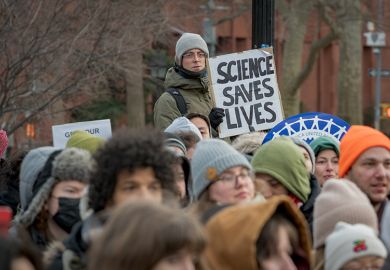Beware tick-box culture: Professor Dingwall warns of over-regulation
Social scientists are drawing up a common set of ethical principles aimed at freeing research from excessive ethics oversight frameworks that hamper their ability to improve social understanding.
According to Robert Dingwall, professor of social science at Nottingham Trent University, a “free” social science research base is as important to a healthy democracy as a free press. But in the past decade, UK and international funders have required universities to vet all research involving human subjects via institutional ethics committees.
“You can imagine how outraged journalists would feel if they had to pre- check with a committee that their questions would not upset someone,” he said.
Professor Dingwall, a member of an Academy of Social Sciences working group on the issue, said committee members often had no expertise in ethics or the research field in question, and were primarily concerned with the university’s reputation. Their risk aversion fed back to academics, who were often disinclined to undertake research that could incur disapproval even if it was potentially important.
The situation was exacerbated, Professor Dingwall said, by the application to social science of frameworks developed for biomedicine. He said the balance of individual risk and social benefit was different in the social sciences because most research posed a minimal risk to individuals and offered significant benefit to the community.
He said that although the US and Canada had recognised that the regulatory system was in crisis, the UK had yet to join efforts to redress it.
The Academy of Social Sciences working group, chaired by Janet Lewis, a visiting professor in Middlesex University’s School of Law, last week hosted the first of a series of symposia with learned societies, the Economic and Social Research Council and other interested bodies aimed at producing a statement of ethical principles common across the social sciences. The hope is that this document, expected in October, will inform improved ethics oversight arrangements for the field.
Professor Dingwall said overregulation of research ethics led social scientists to see it as a mere tick-box exercise. This created a danger that once approval was received, their ethical sense was “turned off”.
In his view, social science research should not require prior ethics approval except in special cases. “If you are going to interview adults, particularly about things that are a matter of public record or where the risk of [psychological] damage is no greater than it would be if somebody asked them a question at the bus stop, it shouldn’t be regulated.”
Register to continue
Why register?
- Registration is free and only takes a moment
- Once registered, you can read 3 articles a month
- Sign up for our newsletter
Subscribe
Or subscribe for unlimited access to:
- Unlimited access to news, views, insights & reviews
- Digital editions
- Digital access to THE’s university and college rankings analysis
Already registered or a current subscriber? Login




